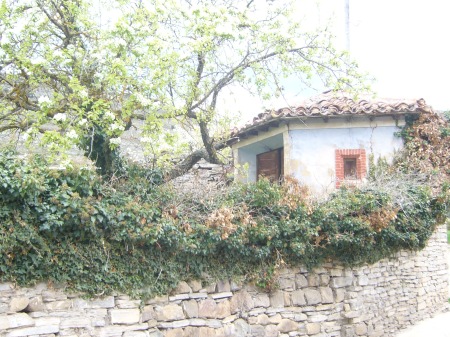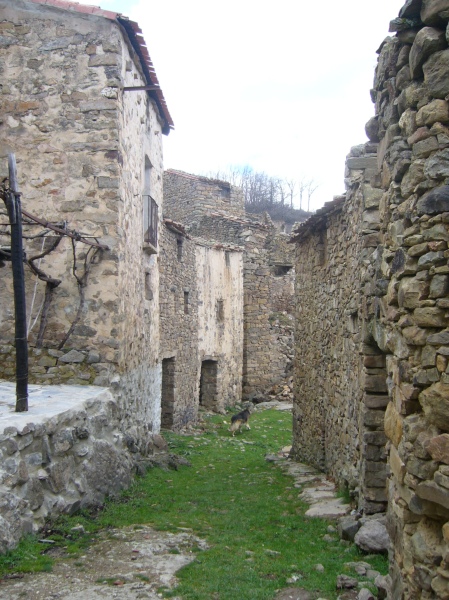You may assume that there is very little social life, and that exciting local events are few and far between if you live in a semi-abandoned vilage in Soria. You would be correct. Once a year there is the traditional herding of the sheep along the Cañadas Reales, the ancient Roman routes to Madrid. There’s the quirky annual fiesta in the nearby village, San Pedro de Manrique, which involves the men running over hot coals with their womenfolk slung, fireman-style, over their shoulders. Alegedly last year the local cura (priest) took part, though he had to enlist a willing young lady in order to participate. At least, I’m assuming that’s what he did, rather than bash a parishioner over the head with a club, caveman-style, and carry her off on his back. The year is punctuated by the usual religious celebrations and Saints’ Days. A charming, resurrected Easter custom takes place in a small village half an hour or so away, which perches like Dracula’s castle on a rocky outcrop. The village stood empty for many years, but was recently repopulated, and now, as in times past, at Easter weekend every household builds a fire in its fireplace which emits a different-coloured smoke from its chimney.
And on the weekend before Easter there really is something to look forward to in Calahorra, a small town about an hour’s drive away, over the border in La Rioja, in a landscape of fertile, allotment-filled valleys. Calahorra is famous for its vegetables: in fact, we just missed by a week the annual gastronomic ‘festival de verduras’ (vegetable festival), announced the year before with a technicolour poster of a succulent dish of cooked vegetables, which, on closer inspection, was, of course, sprinkled with chopped ham. But we were visiting in time for an event which Angel and Pili suggested we all attend: the Roman Market. Picking up on their enthusiasm, and sensing that they perhaps don’t get out much, we agreed whole-heartedly. Any misgivings I might have had were quashed almost immediately on arrival. Emerging from a side alley onto the main thoroughfare which was thronged with stalls selling ‘Roman’ food and nick-nacks, we were startled by a loud fanfare and then crushed against the stalls as a legion of Roman centurions yomped past, scattering pushchairs, hand-holding couples and meandering grannies. A stern-faced messenger-boy preceeded the swarm of swarthy soldiers, bearing a golden staff with which he pushed people aside, clearing a space for them to march through. My mother and I were man-handled to one side, and stood watching admiringly as the conquerors stomped past in their tunics and breastplates, eyes focused forwards, standards high, like the cut of their hemlines. It was a blur of regal purple, fluttering flags, gold, leather, flashing swords, hairy legs and unshaven chins. If there was a paradise on earth, this was it, as far as I was concerned.
After the initial excitement, we wandered around perusing the stalls, which offered silver jewellery in unusual designs which I now wish I had bought, huge, round cheeses which let off a pungent smell , home-made cheesecakes, honey, spices, dried teas, leather sandals, and tacky garden ornaments including horrendous Bill-and-Ben flowerpot men made out of wood with Pinocchio noses and dried flowers for hair, objects I suspect your average Roman would have recoiled from in as much horror as we did. We sipped wine from terracotta cups and ate rich, deep red, sweaty chorizos. Then we headed up to the square as there seemed to be a bit of a commotion going on up there. On the way we passed a cross-section of a wooden Roman galley-ship which had been converted into a kid’s climbing-frame and was swarming with excited toddlers, a roped-off area strewn with straw in which a rather portly gladiator was training two very small boys to hit each other with real metal swords, and a side-stall selling beautiful headpieces of woven flowers, both fresh and artificial, where a man held up a mirror so that a coquettish four year-old in the crook of his arm, wearing one of these garlands, could admire herself. There was something uinversally pretty and historically nostalgic about these traditional crowns of flowers that drew little girls to the stall as if hypnotised, each one of them wanting to be a princess. I felt myself slipping into a trance as well: some genetic memory of maypoles and cornfields, a flash of medieval hey nonny-nonny, but I was awoken from my reverie by the sight of a small, tubby girl in hot pink leggings and a horizontally-striped t-shirt that made her look like a strawberry humbug, grabbing her mother’s hand and demanding a garland for her own head, her eyes shining with princess-lust.
We were not disappointed when we arrived at the sqaure. First of all there was an open-air compound housing a selection of impressive birds of prey, tagged and tied loosely to waist-high stands: various types of eagle, several owls who surveyed the crowd at almost 360 degrees with their stunning, cold, yellow eyes, and even a vulture with white, cotton-like bumfluff around its neck, and a pastel pink and blue head. But even better than this, a gladiator contest taking place before our very own eyes, where, in a circle of sand close enough to touch, beefy men, stripped to the waist, beat each other with swords or with their bare hands. Acted with convincing gusto, and one suspects, some pleasure in the physical brutality, there was also a scene where the losing gladiators were roughed up by their Roman handlers, and ‘sold’ to spectators.
‘Who will buy this slave?’ spat a thick-necked, bald-headed brute, covered in not very authentic tattoos and wearing heavy gold earrings, grabbing one of the losers by the arm and heaving him to his feet before casting him back down into the dust.
‘I will….’ I breathed wistfully. Now, where was that bag of coins? But the slave was sold to a rich man in a white tunic and red cloak, and dragged away into a tent. The fighting continued, with much fanfare and grunting, the sun toasting sweaty backs and arms red, swords and shields clashing, and flesh slapping with a sound that reminded me of the noise our local butcher in Calle de la Fe makes when he slams his hand with satisfaction onto a juicy side of meat he is about to carve up. I surveyed the crowd, privately concluding that there were a lot of very happy women and gay men in Calahorra this fine afternoon.
Later in the afternoon we met a friend of Angel and Pili’s for a drink, a local man who is apparently ‘very big in vegetables.’ He has several pickling and canning plants, and his wares apparently sell well in the gourmet club at Corte Ingles. As we sat in the plaza sipping cool beers he told us of a local custom which is peculiar to Calahorra, and takes place (according to him) only between Good Friday and Easter Sunday, (according to the internet, Easter Thursday and Good Friday) due to a dazzling bit of Catholic logic: this is precisely when Jesus is dead and can’t see what you’re up to, so you can get away with it. The activity is a billiard-style game called Juego de los Borregos, played on a table with only one pocket, and with eight small balls and a cue which is used horizontally like a handlebar to push the balls at the pocket. I am still at a loss as to which balls one is supposed to pot or not pot. The game is played only in the two casinos in the city, and women are strictly forbidden to attend, even as spectators. It draws huge audiences, and even huger bets, often groups of friends betting a massive sum of pooled money. The man who was big in vegetables told us of nights in his youth when he and groups of friends bet several thousand pesetas at a sitting, and normally lost. He was usually the treasurer.
‘I always kept a sum aside after it had gone in the kitty,’ he told us, with a wry smile, ‘all my mates, they said no, put it all in, bet the lot, come on, but I always insisted on keeping some back. Then at the end of the night, when we’d lost the lot, at least we had enough to go for a slap-up meal together and a few drinks.’
For some reason this game produces a kind of gambling frenzy in its followers, perhaps fuelled by all-night drinking, and there are a lot of rumours in Calahorra about fortunes made and lost, none of which are proven, but it is recorded that people have bet their cars, their businesses, and even their homes, and in most cases, have lost them. I didn’t like to say it, but I suspected that women weren’t allowed because although there are women gamblers, in general they are less likely to bet the house away from under them and their children.
‘Oh, I know a man who bet his wife once!’ said the Big Vegetable man, but I think he was joking.
After a day of strapping Romans and weird Easter customs, we headed back through the valleys full of allotments and away from Rioja province. Before lunch we had sat at another local bar in a side plaza next to a ‘Peña’ – a building with a roll-up metal door that looked a bit like a bus station, watching the ‘romans’ go in, and come out as unremarkable men in track suits, carrying sports bags with metal breast plates sticking out of them, feathered helmets carried in plastic bags, swords under the arm. In the car Angel told me that it’s very common in Calahorra for people to find Roman remains when carrying out building work at home, or on work premises.
‘Wow, do they get someone to come in and excavate, then? I asked, naively.
‘No.’ replied Angel. ‘What normally happens is, if they alert the authorities, they take about three years to come and do anything about it at all, seeing as you’re dealing with lazy-arsed civil servants who don’t give a shit about anything. In the meantime, your business is at a total standstill because you can’t do anything, you can’t carry on, you can’t call the renovations off. So instead, what most people do, if they find something, is they come in, in the middle of the night and they smash it all up so no-one knows there was ever anything there. Then they can carry on with the building work as planned. Otherwise nothing ever gets done. That’s Spain for you.’





